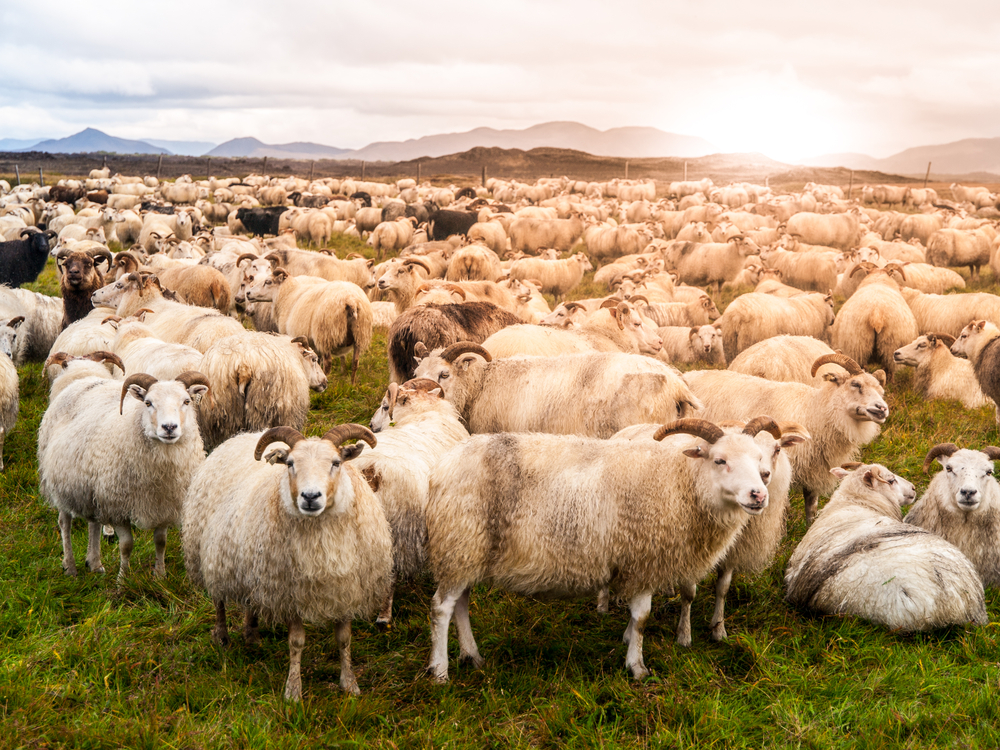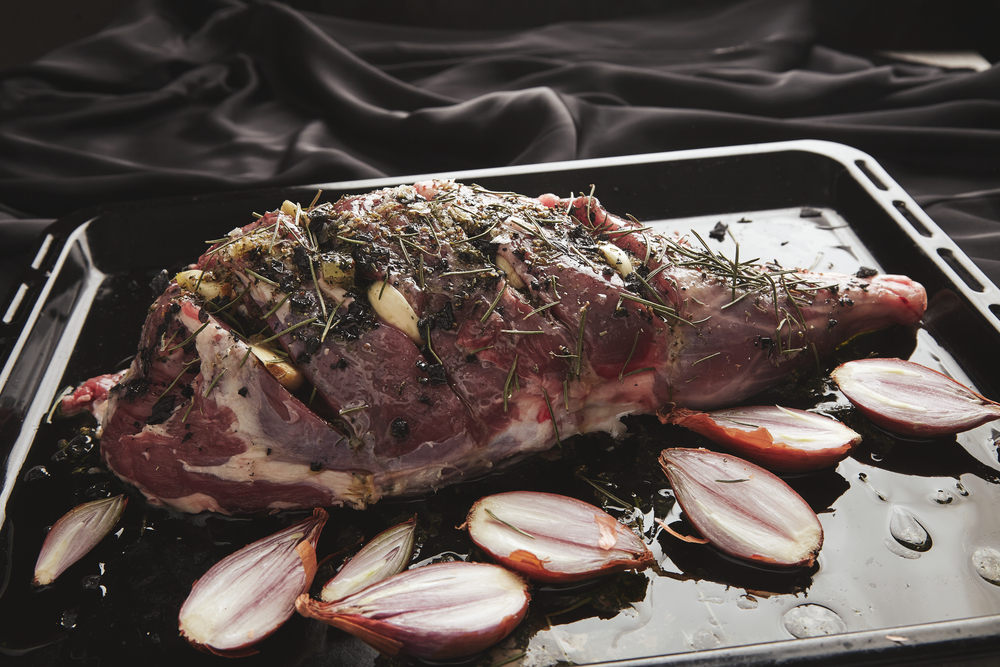Five Arrested in Food Crime Probe
NFCU officers, together with police, attended a location in London on Monday 25 November 2024 where they discovered unrefrigerated vans containing 48 sheep carcasses.
The meat is thought to be illegal, having undergone a smoking process with its skin on, and is not traceable. Meat should have traceability from farm to fork and be subject to checks by FSA vets and meat hygiene inspectors.
As a result, police arrested five men who were interviewed by NFCU officers. All five have been released under investigation.
FSA
Icelandic Lamb Gains Protected Status
Reykjavík, Iceland – 4 December 2024 – Icelandic Lamb has officially been granted the prestigious Protected Designation of Origin (PDO) status by the European Union, marking a significant achievement for Iceland’s agricultural sector.
This certification recognises the unique qualities and traditional production methods of Icelandic Lamb, ensuring that only lamb raised in specific regions of Iceland can bear this esteemed label.

The PDO status acknowledges the exceptional quality of Icelandic Lamb, renowned globally for its distinctive flavour, tenderness, and high-quality meat.
Raised in Iceland’s lush pastures amidst pristine landscapes, the lambs graze on a natural diet consisting of wild herbs, grasses, and seaweed, which contribute to the unique taste that has made the product a treasured delicacy.
“The PDO designation is a tremendous accomplishment for Icelandic agriculture and a tribute to the dedication of our farmers,” said Guðbjörg Ríkey, head of the Icelandic Meat Producers Association. “This recognition ensures that consumers worldwide can enjoy Icelandic Lamb with confidence, knowing it has been produced to the highest standards, in accordance with traditional practices passed down through generations.”
The PDO status guarantees that only lambs born, raised, and slaughtered in Iceland are allowed to be marketed as “Icelandic Lamb”, safeguarding its authenticity and heritage. It also offers greater protection from counterfeiting and misuse of the name in international markets.
Icelandic Lamb is particularly valued for its lean, tender meat and rich flavour, which is enhanced by the island’s clean, unspoiled environment and traditional free-range grazing practices. The lambs are raised without the use of growth hormones and are fed a diet that includes nutrient-dense wild plants.

The PDO status for Icelandic Lamb now joins other renowned Icelandic products such as Icelandic Skyr, further elevating Iceland’s standing in the global market for premium, sustainably produced food.
As part of the EU’s PDO scheme, Icelandic Lamb will benefit from additional protection against imitation and unfair competition, ensuring that the name remains synonymous with quality and authenticity.
This certification is expected to enhance export opportunities for Icelandic farmers and open new doors to markets across Europe and beyond.
With the PDO status now in place, Icelandic Lamb is set to become a more prominent player in the premium food sector, appealing to discerning culinary enthusiasts who seek products rooted in tradition and heritage.
As the PDO logo appears on packaging, it will stand as a symbol of distinction for Iceland’s prized lamb, celebrated both at home and abroad.
About Icelandic Lamb
Icelandic Lamb is a premium meat product from sheep native to Iceland, raised in the country’s unspoiled natural environment. The lambs graze freely on Iceland’s hillsides and coastal areas, feeding on wild grasses and herbs.
Known for its rich, distinctive flavour, Icelandic Lamb is considered a national delicacy and is highly prized by chefs and food lovers for its tenderness, taste, and sustainability.
Paraguay’s Beef Exports to Hit Record High
In the first eleven months of the year, Paraguay has exported some 320,000 tons of beef with revenue reaching 1,6 billion dollars, indicates data from the National Animal Health and Quality Service (Senacsa).
This figure and revenue will show that 2024 will be the highest on record since 2016.
Chile remains the main market for Paraguayan beef having taken some 36% of total exports. The second market is Taiwan with 11%. (Paraguay is the only country in South America which maintains full relations with the government in Taipei). Other significant markets are Brazil with 9%, United States and Israel with 8% each. Russia received 5% of the shipments, while the European Union accounted for 4% of Paraguayan beef exports.
Paraguay in 2023, according to US Department of Agriculture, was among the ten top exporters of beef with 445,000 tons. The list as the leading exporter is headed by Brazil over 3 million tons.
Likewise by the end of November, Paraguay exported over 11,000 tons of pork, equivalent to some US$ 31 million in revenue. Here again Taiwan was the leading market, acquiring 87% of pork exports, followed by Uruguay with 12%.
Regarding poultry, Paraguay so far in eleven months has exported more than 6,000 tons of chicken meat, generating more than US$ 10 million.
China Buys More Argentine Beef
China figures as the main market for Argentine beef, having absorbed in nine months to October 78% of exports, based on data from the ABC Consortium, which represents the country’s largest beef exporters.
Argentina’s exports of beef totaled 641,900 tons in the first ten months of the current year, (Jan/October) a 14.3% increase compared to the same period in 2023. In terms of revenue, these shipments generated US$ 2.5 billion, a 7.2% increase over the same period last year.
During October, exports reached 68,400 tons of refrigerated and frozen beef, equivalent to US$ 274.3 million. However, this represented a month-on-month decline of 5.9% in volume and 8.4% in revenue, according to the ABC Consortium’s report.
Other significant buyers of Argentine beef include, Israel with 6.7%; United States, 4.7%; Germany 4%; Netherlands 3.8%, Mexico and Italy, 1% each.
Despite China’s dominance as a buyer, the prices paid by Chinese importers for Argentine beef remain low, averaging US$ 3,360 per ton in October 2024. This is a sharp drop from the peak price of US$ 5,900 per ton achieved in May 2022.
China Lifts Trade Restrictions on Australian Meat Processing Facilities
China has lifted trade restrictions on two Australian meat processing facilities, allowing the full resumption of red meat exports to the country, the Australian government announced on Tuesday.
This move marks the removal of restrictions from all 10 Australian abattoirs that were banned between 2020 and 2022.
The bans were initially imposed around the time China blocked imports of various commodities from Australia, including coal, barley, and wine. Since the new government took power in Canberra in 2022, almost all these restrictions have been lifted, with trade in lobster, the final banned product, set to restart by the end of the year.
Prime Minister Anthony Albanese welcomed the news, stating, “This is great news for Australian exporters, producers, and farmers. Since we were elected we’ve worked tirelessly to resume trade and that’s exactly what we are seeing. It’s a win for trade and a win for Australian jobs.”
Original story by RTHK
Brazil Resumes Meat Exports to French Stores
French supermarket giant Carrefour apologized so that Brazilian meatpackers would end their boycott of the group and resume deliveries to stores nationwide, Agencia Brasil reported Tuesday.
The measure had been adopted after the company’s CEO Alexandre Bompard said last week that meat produced in the South American country did not meet European standards for which he was forced to recant.
“We know that Brazilian agriculture provides high-quality meat, respect for standards and taste. If Carrefour France’s communication generated confusion and could have been interpreted as questioning our partnership with Brazilian agriculture and as a criticism of it, we apologize,” he said in a letter sent to Agriculture Minister Carlos Fávaro.
The crisis began when Bompard posted on a social network the letter he had sent to French producers, promising not to use meat from Mercosur countries in French markets. The message was poorly received by Brazilian producers, who started a movement to boycott the supply of meat to Carrefour’s markets in Brazil.
The Masterboi meatpacker, which supplies between 400 and 450 tons of meat a month to Carrefour stores, told Agência Brasil that it had suspended new meat deliveries since the weekend. However, with Tuesday’s retraction, the company has authorized the resumption of deliveries. According to Carrefour, there have been no meat supply problems in recent days.
In a statement sent to shareholders, Carrefour Brasil said that deliveries had resumed. “The delivery schedule for beef products has been resumed and the Company expects the normalization of the replenishment of such products over the next few days,” it said.
Smithfield Meat Market to Close Permanently After 850 Years
London’s historic Smithfield meat market, the oldest in the capital, is set to shut down permanently by 2028 after its operators voted against relocation plans.
The market, which has been in operation for 850 years, was initially slated to move to a £1bn development in Dagenham, along with Billingsgate fish market in Canary Wharf, which will also close.
The City of London Corporation, which owns and operates both markets, decided to reject the relocation plan due to a surge in construction costs and wider inflation. The corporation has committed to working with market traders to help them find alternative premises and has offered compensation to the traders.
Chris Hayward, policy chairman of the City of London Corporation, stated that the move “represents a positive new chapter” for the markets. He emphasized that by stepping back from direct market operations, the corporation aims to create opportunities for these businesses to thrive independently.
Traders, however, expressed concerns, telling the BBC that “it’s all about the money now.”
For more details, you can read the full story at Farming UK
Smithfield Market’s 900-Year Legacy Under Threat as Vote Looms on Future
London’s historic Smithfield Market could be facing its final days as a crucial vote on its future is set to take place today, 26th November. The 900-year-old meat market, one of the oldest of its kind in the world, may be closed permanently, after the City of London Corporation announced plans to shut it down.
The Corporation had previously unveiled a controversial £1bn scheme to relocate both Smithfield and the Billingsgate fish market to a new site in Dagenham, east London. However, escalating costs and budget overruns have led to a shift in policy, with the Corporation now recommending that the markets be closed and traders offered compensation packages.
Reports suggest that compensation payments could total more than £300 million, raising concerns about the long-term economic impact of the closure on London’s food supply. This significant sum comes as part of a broader move to revamp the City’s iconic trading hubs, turning the Smithfield site into a mixed-use cultural development, while redeveloping Billingsgate into housing.
The fate of Smithfield and Billingsgate markets will be decided in a private meeting of the Corporation today, with the vote expected to be a pivotal moment in the ongoing debate over the future of London’s historical trading sites. If the proposal passes, it would mark the end of an era for Smithfield, which has been a cornerstone of the city’s meat trade for nearly a millennium.
The decision is likely to trigger further debate about London’s changing urban landscape and the potential loss of cultural and economic heritage at a time when the city is undergoing significant redevelopment. Critics argue that the closure of such historic markets risks eroding the traditional fabric of the city, while proponents insist that modernisation and regeneration are essential for London’s growth.
As the clock ticks down to the vote, the future of one of London’s oldest and most cherished institutions hangs in the balance.
Original story by LBC News
Halal Lamb Claims Third of UK Market Share
Halal meat now accounts for 30% of lamb sales in the UK, according to new research from the Agriculture and Horticulture Development Board (AHDB).
The findings shed light on how the consumption habits of halal meat consumers have evolved since the Covid pandemic and the cost-of-living crisis, providing valuable insights for farmers and the wider meat industry.
The AHDB report delves into the behaviours and preferences of halal meat consumers, helping businesses in the sector better understand what drives their purchasing decisions. It also highlights the significance of Islamic festivals and offers key opportunities for the halal meat sector to meet the growing demand for specific products.
While Muslims represent around 6.5% of the UK population, they are a crucial consumer base for lamb, contributing to a notable portion of the market. Despite a steady decline in lamb consumption over the last two decades, mainly due to the higher price of lamb compared to other meats such as chicken, lamb continues to be a key protein source for the Muslim community. In fact, 80% of halal consumers eat lamb weekly, and 64% consume mutton weekly—figures that far exceed the 6% of the general UK population who include lamb in their diets.
The research also reveals that Muslims spent £823 million on halal meat alone in 2023, a substantial sum that highlights the growing market for halal products. In comparison, in 2016, UK Muslims were estimated to have spent £4.64 billion on halal food and beverages, reflecting a significant shift in spending patterns and consumption habits in recent years.
The findings indicate that farmers and producers could benefit from gaining a deeper understanding of the halal market and its unique requirements. By tailoring offerings to suit the preferences of halal consumers, the industry has the potential to tap into a lucrative and loyal consumer base, ensuring long-term growth for the sector.
As demand for halal products continues to rise, the AHDB’s report offers a timely opportunity for the industry to better meet the needs of Muslim consumers, ensuring that they continue to enjoy high-quality halal lamb and mutton products while supporting the growth of this important market.
Source: AHDB
